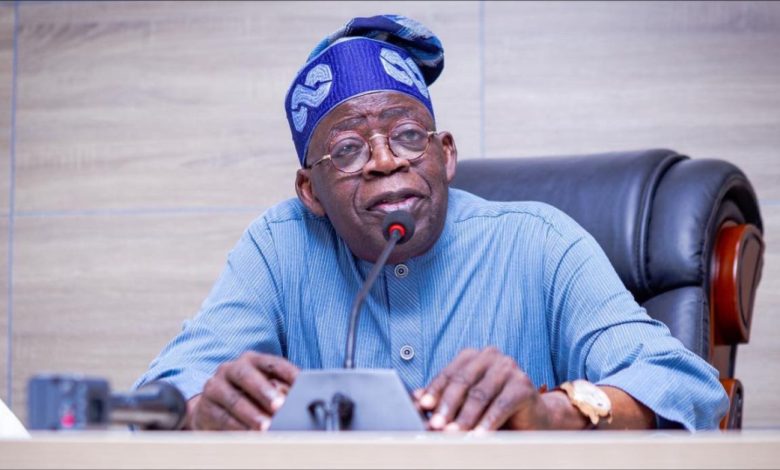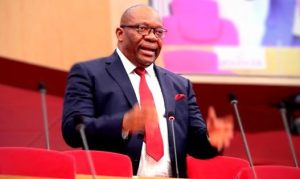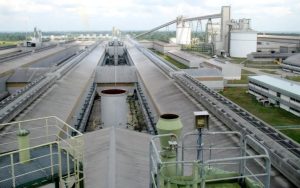Federal Government’s $465 Million Dollars For ALSCON’s Revival –To Be Or Not To Be?
By Substance Udo-Nature

In July, 2024, the Minister of Petroleum Resources (Gas), Dr Ekperikpe Ekpo, led a Nigerian delegation of prospective investors that included top officials of BFI Group of America and some core partners in the privatisation of the Federal Government’s shares in ALSCON on a visit to the headquarters of China National Chemical Engineering Corporation (CNCEC) in Beijing. The gas minister was among the top government officials who accompanied President Ahmed Bola Tinubu on a state visit to China while he also participated in the Forum of China-Africa Cooperation (FOCAC).
In a statement later released by his spokesman, Louis Ekpo, the minister said the return of ALSCON to operation will contribute to the nation’s economy, generate employment and boost investors’ confidence, assuring that they will reap ample returns on their investments. He said the move was an indication of the President Bola Tinubu-led government’s unwavering commitment to attracting and protecting investments in the country. Ekpo’s assurances served as a beacon of hope to investors who over the years have been wary of committing their investments and resources to the moribund ALSCON.
Commending BFI Group of America, led by Dr Reuben Jaja, for the renewed interest and for engaging CNCEC to reactivate ALSCON, Ekpo stated, “I am impressed today that the chairman/managing director of BFI Group of America, Dr Jaja and his company have engaged the CNCEC to come and reactivate ALSCON to kick-start full operations. The gains that will be obtained at the end of the day can never be underestimated because they will create employment opportunities, raise revenue, boost production and of course bring down the cost of aluminium in the country”.

On Friday, July 21, 2024, President Tinubu also received the management of ALSCON, led by the chairman, Alexey Amautov, at the State House and assured his visitors of the government’s commitment and readiness to support investments in the country. “Smelter is necessary for the development of the country,” he emphasised, calling for detailed plans in the steel and energy sector. “There must be timeliness”, he was quoted to have said. Amautov in turn told the President that management was aware of the importance of aluminium to the country. The President accordingly directed the Minister of Steel Development, Prince Shuaibu Audu, and the Special Adviser to the President on Energy. Ms Olu Verheijen, to review and provide him with updates on the status of ALSCON.
Since then, the next promise to be launched or laundered by the Presidency is the announcement on Wednesday, August 12, 2025, of a $465m investment proposal to revive ALSCON as part of the country’s plan to revamp the steel sector. The initiative was unveiled at the inaugural Stakeholders Summit on the Development of the Steel Sector in Abuja, targeted at the possibility of creating 500, 000 jobs and making Nigeria a steel hub in West Africa and driving industrial growth by 2030.
Represented by the Vice President, Kashim Shetima, they promised to make Nigeria the enviable bride in the steel sector in West Africa as an incentive to drive economic diversification. The President said it was the motivation behind the creation and reconfiguration of the Ministry of Steel Development back in 2023.

“A new investment proposal of 465 million dollars has been submitted by the current management. The six-year plan to restore full capacity would be announced after a detailed review of the ministry’s recommendation”.
According to the Federal Government, other steel-related companies to benefit from this renewed drive include Ajaokuta Steel Company; the National Ore Mining Company, and the Delta Steel Company (now Premium Steel and Mines). In fact, it was further hinted that the government has attracted a new project by Stellar Steel, a subsidiary of the Inner Galaxy Group. The projection is that by 2030, the country will target producing 10 million tonnes of liquid steel.
But there are reservations, and deservedly so. All previous promises of revival of ALSCON since 2009 having come to nought, anything that sounds like a possibility or good news about ALSCON, Ikot Abasi, is as good as music to the ears of millions who have been following the government’s inconsequential promises. Anything positive about ALSCON nowadays automatically falls into the category of a “developing story” and tantalises those who can afford to believe the government.
Related: Senator Sampson Makes Case For ALSCON, As Senate Re-Investigates Ajaokuta Steel Co.
In other words, like the endless promises of resumption of operations at the Port Harcourt refinery “soon”, but everything every time gradually fading into interpretative quiet and official abracadabra, so seem to sound recent pronouncements by the Federal Government or representatives of government on resumption of activities at the moribund Aluminium Smelter Company (ASLCON).
In June, 1999, operations in ALSCON were gradually grounded due to lingering differences between Ferrostaal and Reynolds and other related issues including a lack of working capital, insufficient gas supply, and a delay in dredging the Qua Iboe River which would have eased transportation and associated needs.
In September 2002, the Bureau of Public Enterprises (BPE), influenced by what was happening, initiated processes for the privatisation of ALSCON and its assets, including the power plants. In 2004, a US-based private firm, BFI Group, indicated interest in buying up the plant and became the preferred bidder for ALSCON after it was said to have offered $410 million. It would later be disqualified by the BPE.
Surprisingly, or incidentally, in 2007, RUSAL paid $205 million and acquired ALSCON and its assets, with the power plant, with ALSCON owning 85 per cent of the aluminium plant and its assets, while the remaining part belongs to the Nigerian Government. Problems started brewing. In 2009, the Nigerian Senate smelt a rat and set up a probe panel to scrutinise the sale of ALSCON. In the thinking of the lawmakers, the sale was worth about 3billion US dollars. The Senate, therefore, suspected some smart moves in the processes that led to the acquisition by RUSAL.
The court was approached. In July 2012, the Supreme Court of Nigeria ruled that BPE revert to the original preferred bidder, BFI Group, which the court also ordered to pay the agreed price of $410 million. But in 2014, the unavailability of gas supply forced the plant to shut down. Matters protracted till 2018 when the Nigerian government and UC RUSAL of Russia allegedly finally agreed and signed an agreement to sell ALSCON to UC RUSAL in what was called “Renewed Share Purchase Agreement (Renewed SPA). Lack of gas supply remained an issue. But in 2021, the Nigerian government concluded arrangements to connect ALSCON power to the national grid, to possibly help it resume its total production.
On January 26, 2024, the Supreme Court reaffirmed its 2012 ruling that BFI Group was the preferred bidder for the smelter company. It is hoped that the government will hem all loose edges and bring life to Akwa Ibom and the country through ALSCON.




